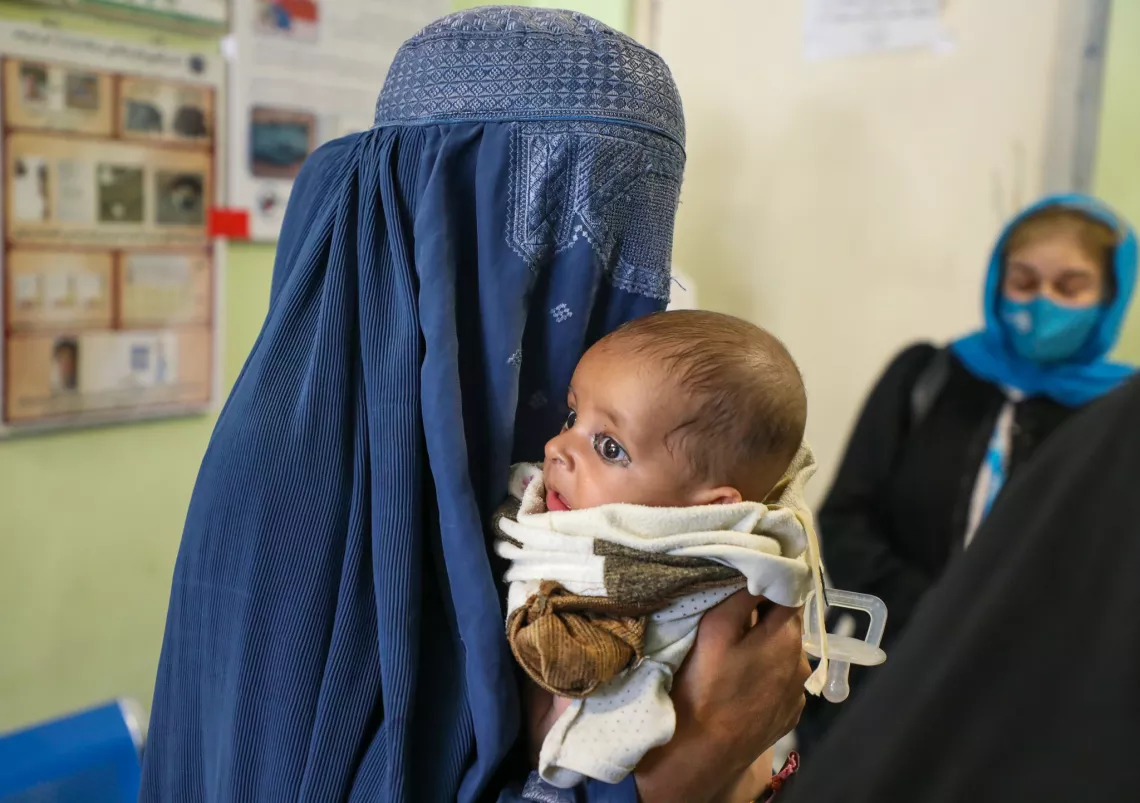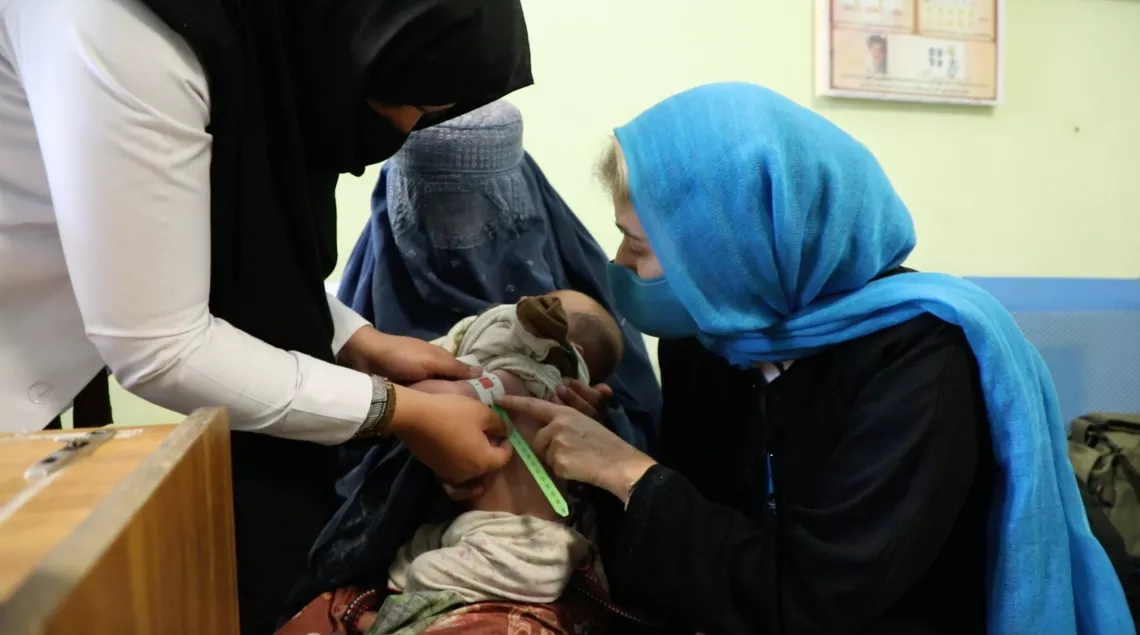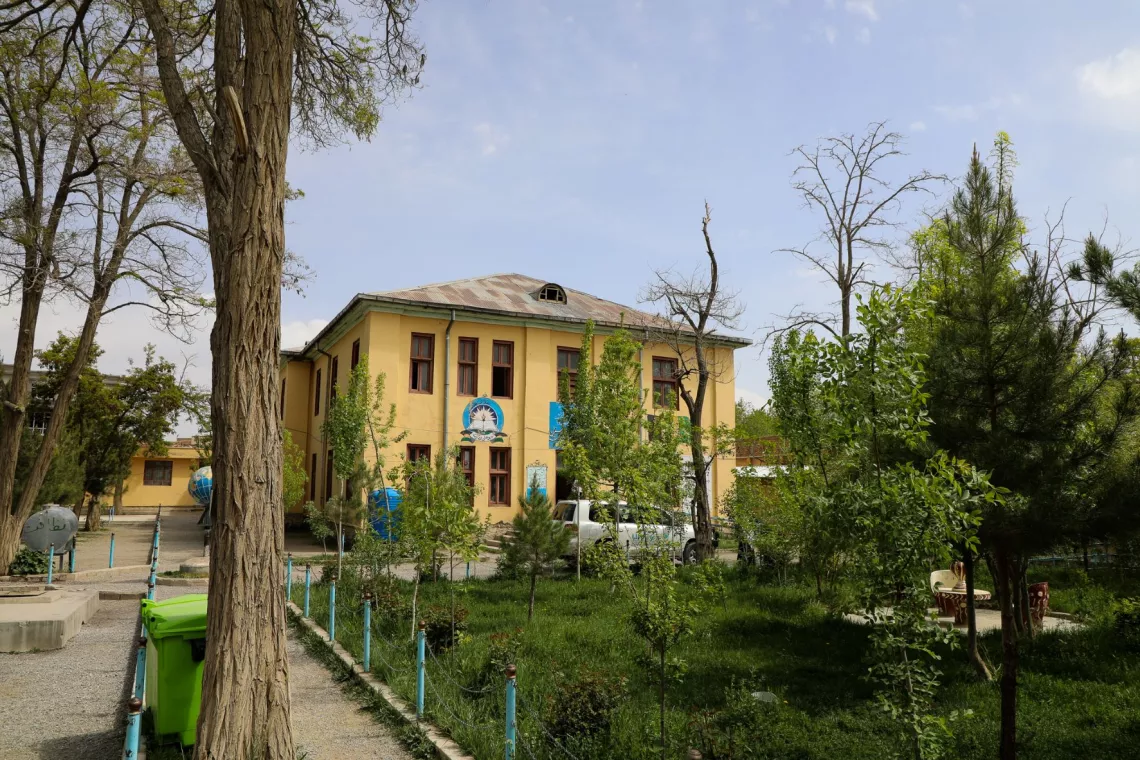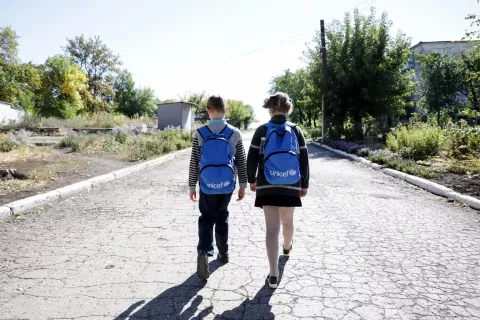16 April 2022
On Saturday morning, the team briefs me. Just weeks ago, the longest road mission of any UN security unit in the past 20 years was carried out by UNICEF.
A UNICEF security specialist in Kabul, along with one of our local security officers, describe the months-long effort. Their 14-person team covered over 2,000 kilometres – from Kandahar, through Urozgan, Helmand and Nimroz, close to the border with Iran. Two thousand kilometres of villages, they tell me, now accessible to UNICEF staff who have stayed in the country to deliver nutrition, education and other essential services for Afghanistan’s children.


As our car rocks across the Tera Pass, the route carrying us south from Kabul, mountains stretch for the sky in every direction. This land once offered passage to travellers the world over, for thousands of years. Today it tells a different story.
On the outskirts of Kabul, we pass children in the streets. A young girl, seeking money for her family. A boy working at one of the market stalls that line the road. It’s two weeks into the holy month of Ramadan, and tables pile high with fruits and vegetables. But there are no crowds here.


The economic crisis in Afghanistan has had a devastating impact on everyday life. When, in 2021, the majority of foreign aid was frozen, critical services collapsed and incomes disappeared. Some 24 million people – more than half of them children – are now in need of humanitarian assistance as families slip below the poverty line. In Kabul and elsewhere, markets abound with goods that few Afghans can afford.
The empty stalls are a stark contrast from the place we’re headed. It’s a three-hour drive to Paktya Regional Hospital, in Gardez, where dozens of families fill the waiting room.

This is one of more than 2,300 health facilities across the country that UNICEF, together with WHO, is supporting. The hospital serves over 75,000 people throughout Paktya Province. As fighting in recent months has let up, more Afghans are able to seek out health care – a blessing for children and their parents. But the jump in demand is straining the health sector. To help prevent the system from collapsing, UNICEF and WHO are providing the supplies, salaries and training needed to keep services running.
No sooner than we arrive, I’m guided into a treatment ward for children with severe acute malnutrition. Six-month-old Rana is one of the infants who have been brought in for screening.

Rana’s mother, Sayera, says her daughter refuses to breastfeed. The youngest of five children, Rana has no appetite and has lost too much weight over the past few weeks. A nurse measures the infant’s arm circumference and confirms what Sayera already fears: Her child is severely malnourished and needs immediate treatment.

Sayera tells me her family eats bread and tea for breakfast, and rice and potatoes for lunch and dinner – the only staples they can afford. Hers is part of the 90 per cent of households in Afghanistan without enough to eat. This year alone, some 3.2 million children are projected to suffer from severe malnutrition across the country.
As we make our way to another part of the ward, Dr. Niamatullah Zaheer, the hospital director, tells me his staff are overwhelmed. The hospital’s only paediatrician regularly screens more than 100 children a day. Even the neonatal unit is stretched. Too often, the hospital is forced to accommodate more than one infant per bed.


We reach an area of the hospital reserved for children with severe acute malnutrition, kept under close observation until they’re well enough to return home.
It’s here that Basmina catches my eye – a little girl (she’s four years old, I learn) sitting straight up in her bed, at the corner of the room. I approach to say hello; she offers me a smile.


This isn’t Basmina’s first stay in the ward. Her 13-year-old sister, Jamillah, accompanies her each time. The girls lost their mother, and their father lost his job. After a few weeks of treatment at the hospital, Basmina becomes just healthy enough to return home. But the family has little access to food and clean water. Basmina’s health deteriorates once more before Jamillah can bring her back to the hospital, again and again.
As I listen to the sisters’ story – a story the nurses witness every day – Dr. Zaheer asks me to convey one message upon my return home: What is being done for these children would not have been possible without the support of the international community.
But needs are rising.
17 April 2022
My second morning in Afghanistan brings a visit I’ve long awaited. Today I’ll be meeting with schoolchildren!
We set off to Halima Khazan School, also in Gardez, where some 2,000 girls and 460 boys attend classes. The school comes into view from my side window as we round a bend – a stunning building, bearing the name of the province’s first female high school graduate. Halima Khazan later assumed responsibility for women’s affairs in Paktya and used her position to promote girls’ education.


The torch she ignited at the school is now carried forward by 40 teachers – almost all of them women – and a female principal, Nisreen. Nisreen wastes no time telling me what the school needs to hold on to success.
“Many of the teachers are mothers. We need a crèche [nursery] for their children, or fear losing them.” The school also needs a borehole, she says, to ensure students have access to safe water.

Our education officers take notes – these are needs we know we can help alleviate. UNICEF has spent decades providing schoolchildren across the world with clean water and sanitation, and our education programming extends to support for teachers too, especially women.
We discuss as we walk: Nisreen is already ushering us to a classroom for Grade 6 girls, whom we catch during an art lesson. With the help of UNICEF’s education officers, I ask the girls for their favourite things to draw (horses!), and their favourite subjects (writing!).


Two girls skip to the front of the room to show us their skills. Their joy for school and learning is so palpable, my breath catches. We don’t yet know – we didn’t, then – if these wonderful, studious girls will be able to graduate to Grade 7.

As fast as I arrive, it feels, I’m off to another part of the school. The first graders are learning their alphabet and numbers. I sit down in the girls’ class. “What do you dream of being when you grow up?” I ask them.
One girl surprises us all. “I want to be a policewoman!” she shouts ambitiously, sending everyone in the classroom into delighted laughter. We clap for her enthusiasm. It’s that enthusiasm, that hope, which stay with me still.

We cannot give up on these children. Schools are more than a place to learn. In these difficult times, they are a safe space for girls and for boys, a place with clean water and food. A shelter from the street, from harm.
UNICEF has been in Afghanistan for more than 70 years, always staying and delivering. Now more than ever. We’re still supporting community-based schools and salaries for teachers. Still providing millions of textbooks and school supplies to children. We’re delivering nutrition programmes and ensuring access to safe, clean water for health workers and schoolchildren.
But all that UNICEF does, we do with the continuous support of the international community. And that support is at risk.
The children of Afghanistan must not be held hostage to politics.
The children of Afghanistan must not be held hostage to politics. The de facto authorities and donor communities must find ways to work together.
I urge the international community to grant us the funding we need to keep providing life-saving aid: to keep UNICEF supporting nutrition programmes, malnutrition treatment, education for girls, access to clean water.
We urge the de facto authorities to deliver on their promises to protect children’s and women’s rights – and to guarantee the right to education for every child in Afghanistan.
The actions we take today will determine if millions of children in Afghanistan will suffer or thrive.





